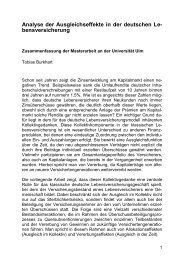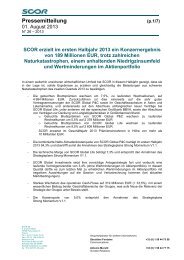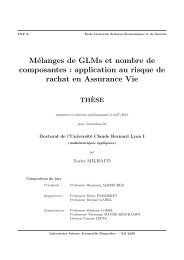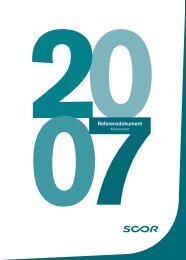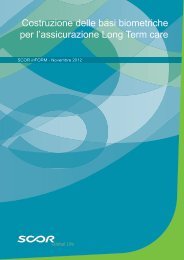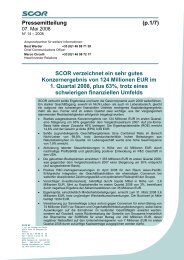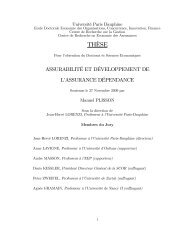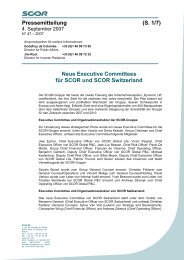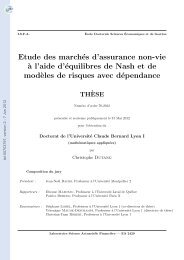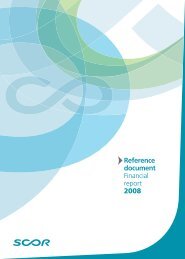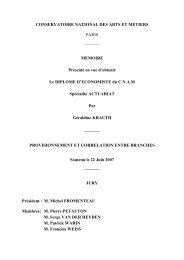4.4 Legal risk - Scor
4.4 Legal risk - Scor
4.4 Legal risk - Scor
Create successful ePaper yourself
Turn your PDF publications into a flip-book with our unique Google optimized e-Paper software.
<strong>4.4</strong>.6 SCOR IS EXPOSED TO RISKS LINKED WITH SOLVENCY II IMPLEMENTATION<br />
The “Solvency II” European Directive, no. 2009/138/EC of 25 November 2009, related to the solvency standards<br />
applicable to insurers and reinsurers ("Solvency II Directive"), lays down, at the level of individual companies and at the<br />
level of groups, the minimum amounts of financial resources that insurers and reinsurers operating in the European<br />
Economic Area will be required to have in order to cover the <strong>risk</strong>s to which they are exposed and the principles that<br />
should guide insurers' and reinsurers' overall <strong>risk</strong> management and reporting..<br />
The new regime represents a significant change in the basis for regulating insurance and reinsurance business in<br />
Europe. SCOR has to review its regulatory capital structures and implement the systems, processes and cultural<br />
changes necessary to meet the new requirements.<br />
Although it is of course not possible to quantify the impact of these requirements, nor their scope, it is very likely that <strong>risk</strong><br />
management and control measures will be reinforced for reinsurers in the near future, which may in turn result in an<br />
increase in regulatory capital requirements (or a reduction in the underwriting capacity) and increase their operating<br />
costs. This could have a material adverse impact on SCOR’s business, present and future revenues, net income, cash<br />
flows, financial position, and potentially, on the price of its securities.<br />
The official date of application according to the latest texts published in the Official Journal of the European Union is 1<br />
January 2014, but there could be further delays. The legislative process setting down the final versions of the Solvency II<br />
regime is still ongoing. The published Solvency II Directive will be amended by the Omnibus II Directive which is still<br />
being negotiated between European co-legislators. When this is concluded, the European Commission will have to<br />
adopt Level 2 delegated acts and the European Insurance and Occupational Pensions Authority (EIOPA) will be in a<br />
position to consult on technical standards that are necessary to make the Solvency II regime effective. Delays in the<br />
application of Solvency II may increase the costs of implementation. Inversely, a fast implementation of certain aspects<br />
of the new regime could also take place, with a yet another <strong>risk</strong> of increased cost for SCOR. This could have a material<br />
adverse impact on SCOR’s business, present and future revenues, net income, cash flows, financial position, and<br />
potentially, on the price of its securities<br />
See “Appendix B – II. Internal control and <strong>risk</strong> management procedures, C. Principal activities and participants of <strong>risk</strong><br />
control” for further information on <strong>risk</strong> mitigation actions.<br />
<strong>4.4</strong>.7 SCOR IS EXPOSED TO CERTAIN LITIGATION MATTERS<br />
SCOR is involved in legal and arbitration proceedings in certain jurisdictions, particularly in Europe and in the U.S. For<br />
more information on this issue, refer to “Section 20.1.6 – Notes to the financial statements, Note 27 - Litigation.”<br />
An unfavourable outcome in one or more of the court or arbitration proceedings described above could have a material<br />
adverse impact on SCOR’s business, present and future revenues, net income, cash flows, financial position, and<br />
potentially, on the price of its securities.<br />
See “Appendix B – II. Internal control and <strong>risk</strong> management procedures, C. Principal activities and participants of <strong>risk</strong><br />
control” for further information on <strong>risk</strong> mitigation actions.<br />
<strong>4.4</strong>.8 SCOR’S TAX POSITIONS ARE SUBJECT TO AUDIT AND APPROVAL BY TAX AUTHORITIES<br />
SCOR operates in numerous tax jurisdictions around the world. Tax <strong>risk</strong> is the <strong>risk</strong> associated with changes in tax law or<br />
in the interpretation of tax law. Additionally, tax laws and regulations may change with retroactive impact. Tax <strong>risk</strong> also<br />
includes the <strong>risk</strong> of changes in tax rates and the <strong>risk</strong> of failure to comply with procedures required by tax authorities.<br />
Failure to manage tax <strong>risk</strong>s could lead to an additional tax charge. It could also lead to a financial penalty for failure to<br />
comply with required tax procedures or other aspects of tax law. If, as a result of a particular tax <strong>risk</strong> materializing, the<br />
tax costs associated with particular transactions are greater than anticipated, it could affect the profitability of those<br />
transactions.<br />
There are also specific rules governing the taxation of policyholders. SCOR will be unable to accurately predict the<br />
impact of future changes in tax law on the taxation of life insurance in the hands of policyholders. Amendments to<br />
existing legislation (particularly if there is the withdrawal of any tax relief or an increase in tax rates) or the introduction of<br />
new rules may affect the future long term business and the decisions of policyholders. The impact of such changes upon<br />
the Group might depend on the mix of business in force at the time of such change and could have a material adverse<br />
effect on its business, results of operations and/or financial condition.<br />
The design of life insurance products by SCOR’s life insurance companies takes into account a number of factors,<br />
including <strong>risk</strong>s, benefits, charges, expenses, investment returns (including bonuses) and taxation. The design of long<br />
term insurance products is based on the tax legislation in force at that time. Changes in tax legislation or in the<br />
interpretation of tax legislation may therefore, when applied to such products, have a material adverse effect on the<br />
financial condition of the relevant long term business fund of the entity in which the business was written and have a<br />
material adverse impact on SCOR’s business, present and future revenues, net income, cash flows, financial position,<br />
and potentially, on the price of its securities.<br />
39



